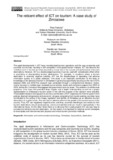Please use this identifier to cite or link to this item:
https://cris.library.msu.ac.zw//handle/11408/3667| Title: | The reticent effect of ICT on tourism: a case study of Zimbabwe | Authors: | Tsokota, Theo von Solms, Rossouw van Greunen, Darelle |
Keywords: | Information and communication technology Zimbabwe Bad publicity Destination |
Issue Date: | 2019 | Publisher: | AfricaJournals | Series/Report no.: | African Journal of Hospitality, Tourism and Leisure;Vol. 8; No. 3 | Abstract: | The rapid developments in ICT have revolutionised tourism operations and the way companies and countries lure tourists, resulting in stiff competition in the global tourism industry. ICT has become the ‘umbilical cord’ of tourism as it has assumed a crucial role in the survival and performance of tourism destinations. However, ICT is a double-edged sword as it can be used with considerable effect either in promoting or downgrading tourism destinations. For example, in situations where a tourism destination is receiving negative publicity, ICT has the disadvantage of spreading that adverse information quickly to a global audience. This study is an important contribution to the body of knowledge on the demise of tourism in Zimbabwe in general but specifically focusing on the role of ICTs between 2000 and 2016.This research was conducted through a comprehensive literature review, mainly focusing on multiple peer-reviewed journal articles, books and conference papers from 2000 to 2016, before the Emmerson Mnangagwa-led government came to power. The selection of articles was purposive. Only those that provided deep insights and in-depth understanding as well as a proper representation of Zimbabwe’s tourism sector in line with the purpose of the research were selected. The available literature strongly points out that a combination of ICT, especially the internet, government policies deemed retrogressive and economic refugees emigrating from tourist-seeking countries have contributed to the soiling of the image, reputation and identity of Zimbabwe as an attractive tourism destination on a global scale. This has had an adverse effect on the growth of the tourism sector in the country. Thus, ICT can negatively impact tourism, and thus, countries intending to lure visitors to their tourism destinations should avoid policies, events and activities that can result in bad publicity in the international media. On the other hand, there is no denying that if used properly ICT can also help to successfully rebrand a tourism destination. For this reason, it is important for national tourism strategies to encompass and interconnect both physical and virtual tourism promotion methods. | URI: | https://www.ajhtl.com/2019.html http://hdl.handle.net/11408/3667 |
ISSN: | 2223-814X |
| Appears in Collections: | Research Papers |
Files in This Item:
| File | Description | Size | Format | |
|---|---|---|---|---|
| article_28_vol_8_3__2019.pdf | Full Text | 341.14 kB | Adobe PDF |  View/Open |
Page view(s)
140
checked on Feb 26, 2025
Download(s)
92
checked on Feb 26, 2025
Google ScholarTM
Check
Items in MSUIR are protected by copyright, with all rights reserved, unless otherwise indicated.


